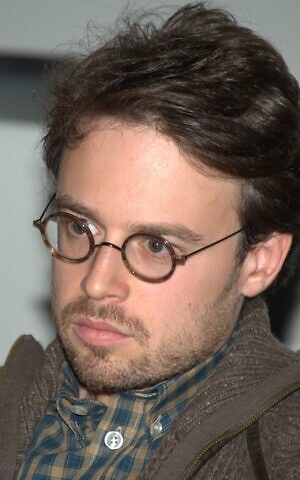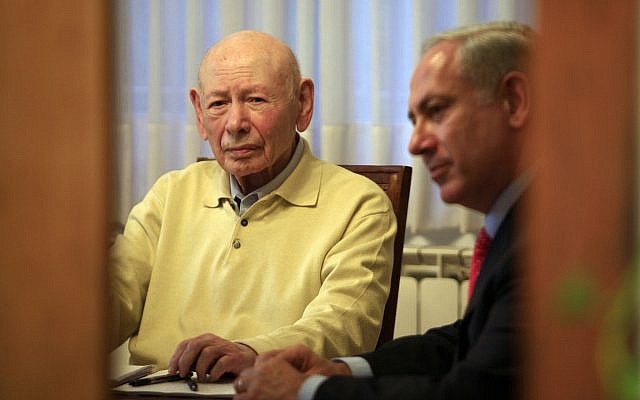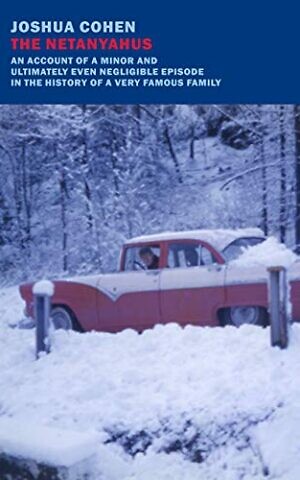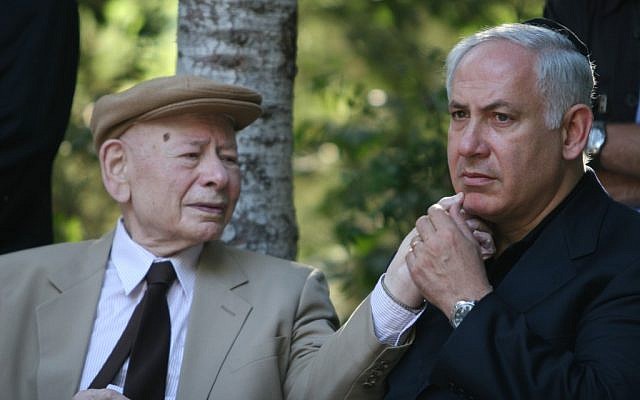alma via JTA – Joshua Cohen’s latest novel, “The Netanyahus: An Account of a Minor and Ultimately Insignificant Case in the History of a Very Famous Family,” imagines a disastrous night in the winter of 1959–60 when Benzion Netanyahu, historian and father of former Israeli Prime Minister Benjamin Netanyahu, interviews him for a teaching position at a fictional college in New York.
Selected as Benzion’s guide to the campus, and placed on the hiring committee, the history department has a Jewish figure: Reuben Blum, our narrator.
What Result is a moving, funny story of Jewish identity, assimilation, history and more. It’s a mix of fiction and non-fiction – the elder Netanyahu was, in fact, a history professor, and he spent time in America. Finally in an author’s note, Cohen writes that the book was written by Prof. Harold Bloom The story of Netanyahu’s interview at Cornell.
“I like the words ‘minor’ and ‘negligible,'” Cohen tells Alma. “Whenever it says minor and insignificant, I say, ‘Well, that’s true.'”
In May, before Israel erupts into conflict again and Benjamin Netanyahu is replaced by his former chief of staff, Alma talks about all things smack about Benzion Netanyahu, Jewish history and eventually his book, hoping to be funny. talked to.
Receive the daily edition of The Times of Israel by email and never miss our top stories
free Sign Up
Minor spoilers for “Netanyahus” ahead. This interview has been lightly edited and condensed for clarity.
Alma: Let’s start at the end. In the chapter “Credits and Extra Credits”, you will note that this story by Benzion Netanyahu was one of the last stories Harold Bloom told you. What struck you most when you first heard the story?
Joshua Cohen: When Harold was asked about the top 10 stories from his life, it was nowhere near the top. Harold – It’s hard to talk about him in the past, because he was such a living person. He comes back just after reading a sentence from her. Beyond famed – or infamous – reputation as a scholar, a critic, a writer, a didactic epistemologist, but also as a popular storyteller, he was also a wonderful storyteller. This aspect of his career was never really put on the page. He never wrote a memoir. He never actually told the stories on the page the same way he told them in person. And how many stories he had!

Author Joshua Cohen at the Brooklyn Book Festival in 2010. (CC-BY 3.0/David Shankbone)
It was a very minor one that he offered to pass up, given some of the overlap between himself and Benzion Netanyahu. And I asked him to tell me the story, and then I told him to tell me again, and to tell me again. Every time he told it, some details changed, some things moved around, and so it felt ripe for imagination. This encounter with history was most interesting to me, from a political point of view, which is not necessarily the way I think Harold thought. [it]. I don’t think you think about personal relationships politically, or these personal encounters. I don’t think he had that much distance.
Where do you find the line between fact and fiction? How do you blur the two?
Slowly. I was allowed to do what I could, but at the same time, part of that permission of some parties relates to the imposition of certain limits in places. In fact, the history I was interested in was the pre-history of the Netanyahu family and the history of Benzion Netanyahu in Palestine, and then in New York and suburban Philadelphia. How did he get here? Why? Why was the family here for so long? How was his career at Hebrew University? What was that atmosphere? How was the Jabotinsky circle?
Certainly, these circles have many histories. But the truth is that Benzion Netanyahu, despite his middle-son kind of beating or demobilization, was a fairly modest figure that doesn’t really come up in many histories of that period. So, it was about tracking down some old professors who still had some memories. And much of it was an academic game of telephone.

Benjamin Netanyahu (R) with his father, Benzion Netanyahu, at Benzion’s home in Jerusalem on February 5, 2009. (Naati Shohat / Flash 90)
The subtitle of your book is “An account of a minor and ultimately even insignificant episode in the history of a very famous family”. Do you really believe that this is a small and insignificant incident, or do you think this story is really the key to understanding Benjamin Netanyahu as we know him today?
not me [think] The sole purpose of the book today is to talk about Netanyahu. I mean, I don’t even know what Netanyahu is today. It’s that paradox: the more someone is written about, the less control you can get over who they are.
I wanted to write something about contemporary politics, and I wanted to write something about identity politics and the campus politics around us. Benzion Netanyahu has a lot to say about tribalism that is what happens when these large ethnic or racial groups collapse – these empires collapse, and they fall into tribalism. Benzion saw it in post-World War I Poland, where he was from. And the lesson you take from this is this: While you may not have legitimacy as a citizen of the Austro-Hungarian Empire or an independent Poland, you are attracted to a group that will define you, your identity. Will take you in. , and provide for you. Who are your people? Who is your clan? Who are your alliances? These questions have come to us in a really strange American context. I wanted to see the roots of these caste politics and these racial politics.
I also wanted to know what it meant to live out of history, in a strange way. With Benzion Netanyahu, there was intense resentment of a man who was “more deserving” and thought he should have had a role at an early stage and was a man born to lead. But, during the most important decade of modern Jewish history, when the State of Israel is being established and Jews are slaughtered in Europe, it is in America. There is a special return of the oppressed when the father, who has been left out of history, raises the son who must return and destroy. A lot of these were questions that were raised under Trump, and the idea of writing directly about these things was somewhere boring and very difficult. So I thought this “slightly negligible event” had all these possibilities.

‘The Netanyahus: An Account of a Minor and Ultimately Even Insignificant Episode in the History of a Very Famous Family’ by Joshua Cohen. (courtesy of)
Reuben Blum says he is a historian who is Jewish, not a Jewish historian. Does the distinction matter?
well it depends! If you’re looking for someone who knows about Jewish history… I think this is one of the questions in the book. does it matter?
In a way, making him a professor of taxation was taking him away from Harold, you know, and claiming that’s the difference. But really, it was about trying to make some comparisons between the past and taxation. The idea that in a constructive sense, the past is a tax on the present. And even though you didn’t work to take off these debts, you’re still paying them off consistently, but you can no longer make a single decision that isn’t historically taxed. And so, whether one is a historian of the Jews, or a Jewish historian: it is really a question of what the tax is?
Do you think of yourself as a writer who is Jewish, or a Jewish writer? Is there any difference there?
I don’t know I mean, I’m an English language writer. In my mind, the idea that any of those distinctions mean anything is insane to me. At this late date in history, and it’s always happening later, I don’t even know what the word author means.
what do you mean by that?
I mean that, when I use it, and I recognize my own biases in it, I usually mean a novelist, and I certainly know how to keep up with the world.
Why are you ready to tell Jewish stories?
I guess I’m attracted to not selling most copies! [Laughs] Yes, I don’t know. I feel like I can only write what I can feel. It’s so hard to write, it’s so ridiculous that the idea of committing myself to something I didn’t have a deeply personal concern for—a personal concern separate from the product of the book—is crazy to me.
If Netanyahu read your novel, what do you think his reaction would be, or what do you expect his reaction to be?
I’ll only hope they’re stupid enough to sue me! Look, I don’t want to be mean about it. It is difficult to talk about one’s parents, about one’s father. In a way, you give up some of that secrecy when you become prime minister, and of course when you become prime minister that is.
I hope I have presented Benzian Netanyahu’s lot of ideas accurately. I think his character is something that his two surviving sons would criticize. i wouldn’t know him, but Bibi – his self-presentation is so manipulative. He comes out fluent in and out of this American style. Still, he feels such pain when he is at home to bury his American side. and then when he’s here [in the US], he switches codes in this very virtuoso way. It’s fair to ask: What is American about this family? What is, and what is American in the illusion of its ideologies? What is this ethno-nationalism that flourished in an American space? Because I think it could really only grow in the US.

Prime Minister Benjamin Netanyahu with his father Benzion during Yoni Netanyahu’s memorial ceremony at Mount Herzl Military Cemetery, Jerusalem, 2007 (Photo Credit: Michal Fattal/Flash90)
The politicization of Jewish suffering is something Benzion as a whole is concerned with, and his job is to “turn trauma into propaganda”. His son seems to be picking up on that idea. How do you look at the work he was doing in the 50s and 60s through a modern lens?
Absolutely. And frankly, there’s a big discussion in American culture in general: How do you write inappropriate characters? Should we place inappropriate characters? To me, the answer is that we should always write inappropriate characters, and we should really give them as much space as we need, because that’s the only way we understand them as humans. It reveals. When I saw a lot of Bibi in Benzion Netanyahu, I see a lot in them myself, novelists in general. Here was a man who lived in relative comfort in America, for whom every moment was an emergency. Every morning when he woke up the world was on fire. A man – in a free society that was not trying to kill him – had the freedom to live in his bubble of panic, and he had to create the panic that his society was not providing him. To me, it was a very good example of what it felt like to be an American novelist.
Panic bubble! My last question: What conversation do you expect around “The Netanyahus”?
I hope this is funny! We’ve been talking this whole time and it’s like I’ve written like a treatise on something. I hope there are some jokes. There are so many questions about history, who gets to write history, how history can be used, and revisionism that are really prominent in an American context. Plus, I hate that element of literature that constantly looks like I’m telling people to eat their fucking vegetables. I would say people have this idea of ”I’m going to read a book to better myself, and then I’m going to rock and eat ice cream out of the container and I’m going to ‘curb my enthusiasm’ or ‘see . Seinfeld.'” And that’s Jewish culture, too. I guess what I want people to take is that the books are no funnier, if not funnier, than Larry David’s creation. And, on top of that, there is some history. Literature’s self-improvement narrative is something I’m really allergic to. I hope that what people take away from it is that dreadful, taboo, angry thing called bliss.